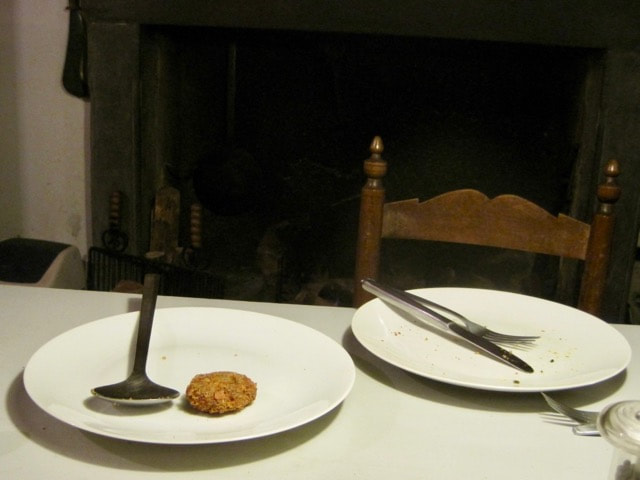|
23 December. I want to make a risotto ai porcini (wild mushroom risotto) over Christmas for which I need some good beef stock, brodo in Italian. I go up to the bottega, the village shop which is also a butcher shop, and tell Eugenia that I want to make brodo. She asks for how many, ‘just you?’ No, maybe three people and I want to put some in the freezer. She tells me I need some muscolo (shin of beef) and some costine di posteriore di pancia (well, bottom end of the breast of beef). If she had a chicken leg, that would be good too, but she doesn’t have one today. Altogether she gives me 800 g of beef plus three small pieces of beef marrow bone. I’ve made beef stock hundreds of times, but I ask her anyway what else she puts in. ‘Odori, un piccolo pomodoro fresco e sale’. Odori is a useful word to know. According to the dictionary, they are aromatic herbs used to season food, but that’s not how the word is used here. Here it invariably means the vegetables that form the basis of most soups, stocks and sauces: onion, carrot and celery, sometimes parsley too. Cinzia, who has the fruit and vegetable stall at the Fornoli market, always makes a present to her customers of a carrot, a stick of celery and a bunch of parsley. For my quantity of brodo, Eugenia suggests one medium onion, two small carrots, and a stick of celery. She turns her nose up at parsley. From the two tomatoes I pick out, she selects the smaller. Back home, I peel the onion and carrots, wash the celery and tomato, fling them along with the meat into a soup pot, cover them with ample cold water and bring it to a very, very gentle simmer — just the occasional bubble. Just as it’s starting to simmer, I skim off the scum (coagulated protein from the meat) several times until it stops rising to the surface. Then I add a little salt and a few peppercorns. I put on the lid propped open with a wooden spoon laid at a tangent across the edge of the pot (a trick I learned from Stefano, who is one of the cooking teachers I use for my clients), but be careful it isn’t anywhere near the flame or it will catch fire (sorry, health and safety). After 3 hours or so, the meat is so soft you can eat it with a spoon and the brodo is a clear amber colour. I strain off the broth, tasting it and the two different cuts of beef. The flavour of the shin is a little more forceful; the breast is softer and fattier which lends its own distinctive taste. Yummy! Such good pure pastel flavours that I’m tempted to drink the broth and eat all the meat right then and there standing at the kitchen counter. But when I was in the shop, I also asked Eugenia what she does with the boiled beef. Daniela, a customer in the shop, offered her views. She makes it into a salad with raw diced winter vegetables and mayonnaise. Eugenia concurs. But I don’t feel like a cold salad when it’s cold outside. What else would they suggest? Polpette (meatballs). Eugenia’s husband Renato can’t bear to stay out of this discussion any longer. He has an apt saying for every situation. In this case: ‘Just surely as psalms are followed by Gloria patri, all leftovers turn into polpette’. Eugenia describes hers. She grinds or chops the meat along with a slice of mortadella, adds some leftover mashed potato or day old bread soaked in water and squeezed out, a couple of small handfuls of grated parmigiano (or one each of parmigiano and pecorino), two eggs, salt and pepper — actually, she realises as she’s speaking, it’s the same as the filling for tortelli (meat-filled pasta pillows) without the Swiss chard. She uses the mixture to make balls about the size of walnuts and flattens them a little, dips them in flour or dry bread crumbs and fries them in vegetable oil. I also add a little finely chopped garlic and some fresh thyme. I use dry bread crumbs because I love the crunchy exterior. Almost forgot to take the photo before they were all gone. Gloria Eugenia!
0 Comments
Your comment will be posted after it is approved.
Leave a Reply. |
Email Subscription
Click to subscribe to this blog and receive notifications of new posts by email. AuthorErica Jarman Categories
All
Archives
October 2023
|
|
copyright 2017 sapori-e-saperi.com | all rights reserved
|
Website by Reata Strickland Design


 RSS Feed
RSS Feed



